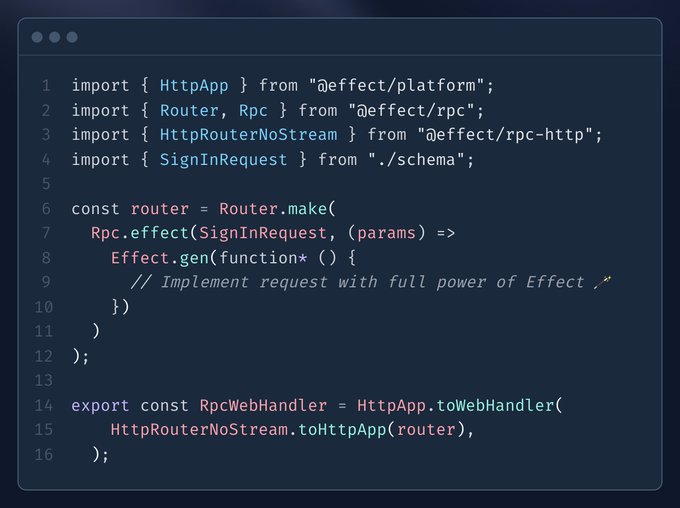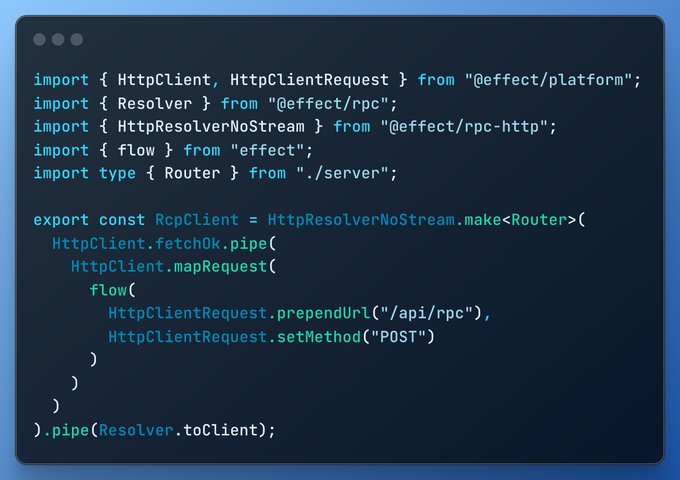I am on a journey to achieve full type safety frontend to backend 🚶🏻➡️
After bumping into some issues with server actions I discovered (effect) rpc.
And it was 🤯
Stop using server actions, there is a better way, it's called @EffectTS_ rpc 👀 ✅ Type safe error handling ✅ As simple as a function call ✅ Full control on request and response When you start using it it works like magic 🪄 Show more
Here is the full story and all the pieces of my type-safe puzzle 🧩
Frontend is becoming more backend-ish
Frontend used to be about styles, components, css and these kind of stuff 💁🏼♂️
Checklist before releasing that new frontend feature of your app ✅ Accessibility ✅ Responsiveness ✅ Analytics events ✅ Security ✅ Error reporting ✅ Bundle size ✅ Performance Well, frontend is complex indeed 🤔 Show more
But then everyone realized that data must come from somewhere, and it's the frontend that is responsible to request it.
Result:
Promise,Suspense, error handling, loading state, and more and more.
We are about to reach a new dimension with React 19: Server components and Server actions ("server" you see 😅).
Frontend is not only "front" anymore, it's time to upgrade your skills to "back" as well.
The convenience and cost of server actions
Server actions come to the rescue: execute server code as simple as a function call 🪄
Catchy promise, convenient, but with some limitations, some of which break my type-safe model:
- No error handling whatsoever
- Serialize/Deserialize is a pain
Error handling in server actions has a large room for improvements 🤔 When an action fails it always returns 500 error, which doesn’t help much with providing a clear error message on the client 👀 Am I missing something?
How server actions work under the hood
Back to the drawing board then 🧑🏫
How can I have the convenience of server actions (single function call) with full type safety?
Behind "a single function call" there are some layers that execute some magic:
- Serialize the function parameters
- Perform an http request to the server passing the parameters in the body
- Deserialize (validate/parse) the parameters on the server
- Perform the request on the server
- Serialize and return the response to the client
- Deserialize the response on the client and provide it as the return of the function called initially
All of these also need to include error handling and serialization/deserialization "out of the box".
Solution: Effect + Effect Schema
There is more 🤩
Every week I dive headfirst into a topic, uncovering every hidden nook and shadow, to deliver you the most interesting insights
Not convinced? Well, let me tell you more about it
Effect rcp: type safe from client to server
Turns out the solution was hiding in plain sight: @effect/rpc 🪄
It works as described above, with the full power of effect for error handling and @effect/schema for serialize/deserialize requests, all provided out of the box:
- Define
TaggedRequestusing@effect/schema(error, success, parameters) - Define shared
Routerimplementation (server requests) - Execute the request on the server (single api endpoint)
- Define http request parameters on the client
- Execute request just like a normal
Effect
This is all type safe end-to-end: the types are shared between client and server 🔥
Use @EffectTS_ rpc on the client, as simple as a function call 🪄 👉 Export HttpResolver that performs a request to the rpc endpoint 👉 Make a request with a single function call 👉 Both request and return type is fully typed (success and error) Show more
Type safety everywhere
My journey to type safety continues:
- The server is as type safe as possible with
effect - Improvements on client/server communication using
@effect/rpc - Powerful and type safe state management on the client using
xstate
You may have heard the saying: "If it compiles it works" 👀
This is the final destination. When you reach that ideal one of 2 things can happen:
- The app works and there are no runtime issues 🏆
- The app doesn't compile, which means the problem is "technically" no solvable. This is usually a sign of some missing detail in the requirements or the domain design, that you can solve before releasing in production 🏆
Speaking of type safety, I am working on something new that may probably interest you (since you are reading this) 👇
This is coming in something I am working on that I'll announce soon 🔜
I am about to announce it soon. Rest assured that you will get to know about it before everyone else as part of this newsletter 👀
See you next 👋





